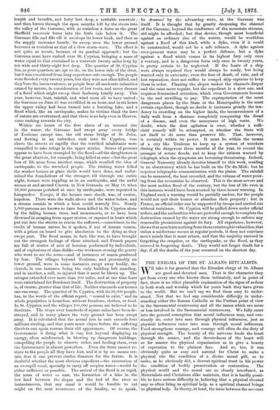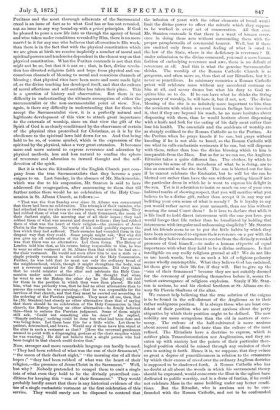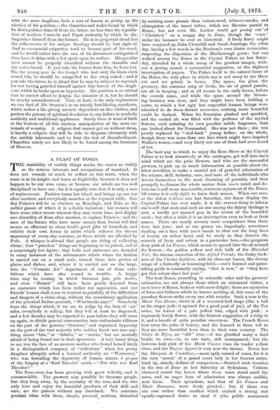THE ENIGMA OF THE ST. ALBANS RITUALISTS.
WE take it for granted that the Ritualist clergy of St. Albans are good and devoted men. That is the character they get from every one who knows them intimately, and in point of fact, there is no other plausible explanation of the signs of ardour in both work and worship which for years back they have given to the world. But we can't say we find them easy to under- stand. Not that we feel any considerable difficulty in under- standing either the Roman Catholic or the Puritan point of view in the Sacramental controversy and all the issues which are more or less involved in the Sacramental controversy. We fully enter into the general conception that moral influences may, and con- stantly do, enter into man through physical influences, just as physical influences enter into man through moral influences. Food strengthens courage, and courage will often do the duty of physical strength. The beauty of the universe feeds the heart through the senses, and the devotedness of the heart will so far master the physical organisation as to give a beauty of expression to the plainest face. And so, too, it was obviously quite as easy and natural for Christ to make a physical rite the condition of a divine moral gift, as to make, as he obviously did, a devout spiritual trust in his power the condition of bodily preservation or restoration. The physical world and the moral are so closely interfused, as Materialists and Christians alike maintain, that it is hardly possi- ble to have serious difficulty in believing that a physical channel may as often bring us spiritual help, as a spiritual channel brings us physical help. In theory, at least, the issue between the severest Puritans and the most thorough adherents of the Sacramental creed is an issue of fact as to what God has or has not revealed, not an issue in any way bound up with a priori principles. If God be pleased to pour a new life into us through the agency of bread and wine taken under conditions revealed by Him, there is no more marvel in it for any one who believes that all creation is His work, than there is in the fact that with the physical constitution which we are given at birth we receive implicitly a number of moral and spiritual powers and tendencies dependent in the closest way on that physical constitution. What the Puritan contends is not that this might not be so, but that it is not so ; that, in fact, divine revela- tion has diverted religious faith and hope from physical and un- conscious channels of blessing to moral and conscious channels of blessing ; that physical rites have been more and more made light of, as the divine teaching has developed itself, and that the culture of moral affections and self-sacrifice has taken their place. This is a question of history and observation. But there is no difficulty in understanding the ultimate assumption of either the sacramentalist or the non-sacramentalist point of view. Nor, again, is there any difficulty in understanding that for those who accept the Sacramentalist view, it is a perfectly natural and legitimate development of this view to attach great importance to the externals of worship, since on that view the gift of the Spirit of God is as clearly conditioned by the observance of certain of the physical rites prescribed for Christians, as it is by the obedience to the spiritual laws laid down for us. And that being held to be so, of course symbol, which is the expression of the spiritual by the physical, takes a very great extension. It becomes more and more natural to express reverence and adoration by physical methods, less and less natural to confine the sphere of reverence and adoration to inward thought and the self- devotion of the spirit.
But it is where the Ritualists of the English Church part com- pany from the true Sacramentalists that they become a pure enigma to us. Last Sunday, in the absence of Mr. Mackonochie, which was due to his suspension, Mr. Stanton is said to have addressed the congregation, after announcing to them that till further notice there would be no celebration of the Holy Com- munion in St. Albans Church, as follows :—
"That was the first Sunday ever since St. Albans was consecrated that there had been no celebration. The triumph of their enemies, who had attacked them for eleven or twelve years, was now complete. They had robbed them of what was the sun of their firmament, the moon of their darkest night, the morning star of all their hopes ; they had robbed them of what was nearest and dearest to them; they had robbed them of what was the heart of their religion—the presence of Jesus Christ in the Sacrament. No words of his could possibly express the loss which they had suffered. Their enemies had wounded them in the deepest way that they could. Some people might ask, 'But why did you give up all celebration of the Holy Communion ? ' The answer was that there was no alternative. Let them listen. The Bishop of London told him that, as his curate, being responsible to him, he was to wear no other vestment at St. Albans than that which he had on— the choir vestment. He would not even allow him to use a stole or a single priestly vestment in the celebration of the Holy Communion. Farther, he was told that he must use only the ordinary bread of the neighbourhood, which, though it might strengthen the body, was not a reverent material for the Holy Communion. Did they think that be could minister at the altar and celebrate the Holy Com- munion under such conditions? He thought that when he went to see the Bishop the other day he [the Bishop] did feel for them in the position in which they were then placed. He told him, what was perfectly true, that he had no other alternative than to pursue the course he was pursuing,—that he WRS responsible for the services of that church, and that they must be carried out according to the ordering of the Purchas judgment. They must all see, then, that he (Mr. Stanton) had clearly no other alternative than that of saying that there should be no celebration of the Holy Communion in that church, the Bishop having no other alternative—he firmly believed this—than to enforce the Parches judgment. Some of them might still ask, Could not something else be done?' Ho replied, Simply nothing ;' nothing could be done but what had been done and was being done. Let them bear this for a little while. Let them be patient, determined, and brave. Would any of them have him stand at the altar in such a vestment as that ? [Here the reverend gentleman seemed to point with a disparaging gesture at the choir surplice which he was wearing.] He did not believe that a single person who had been taught in that church could desire that."
Now, stronger and more remarkable language can hardly be used. "They had been robbed of what was the sun of their firmament," "the moon of their darkest night," "the morning star of all their hopes ;" "they had been robbed of what was the heart of their religion,—the presence of Jesus Christ in the Sacrament." Well, but why ? Nobody pretended to compel them to omit a single iota of what even they hold to be the divinely prescribed con- ditions for keeping this "sun of their firmament." They would probably hardly assert that there is any historical evidence of the use of a single eucharistic vestment at the first celebration of this service. They would surely not be disposed to contend that
the infusion of yeast with the other elements of bread would limit the divine power to effect the miracle which they suppose to be worked in every act of consecration. All that even Mr. Stanton contends is that there is a want of human rever- ence in doing these acts without surrounding them with the proper paraphernalia of ceremonial honour. Well, but if these are omitted only from a moral feeling of what is owed to the law of the State, where is the deficiency in reverence ? If, under submission to the divine command, you omit a mere human fashion of embodying reverence and awe, there is no default of reverence at all. And this is what the genuine Sacramentalist thinks. The worship of the Roman Catholic Church is as gorgeous, and often more so, than that of our Ritualists, but it is never so punctilious. In misionary countries a Roman Catholic priest will celebrate mass without any sacerdotal costume on him at all, and never dream but what his duty to God re- quires him so to do. If he can have what he thinks the fitting pageantry of worship, he will have it, but if not, not. The divine blessing of the rite is so infinitely more important to him than the accidents with which reverent human feelings have invested it, that if they are beyond his reach, he no more hesitates about dispensing with them, than he would hesitate about dispensing with a knife and fork for the eating of his daily meat rather than lose his health. The essentials and the accidents of worship are as sharply outlined to the Roman Catholic as to the Puritan. As the Puritan when he prays kneels if he can, but prays without kneeling if he is not able to kneel, so the Roman Catholic will use what he calls eucharistic vestments if he can, but will dispense with them, rather than lose the divine blessing which to him is inseparable from the Mass. But as far as we can see, the Anglican Ritualist takes a quite different line. The clothes, by which he expresses his sense of the sacredness of what he is doing, are to him as essential as the rite itself. The sun is blotted out for him if he cannot celebrate the Eucharist, but he will let the sun be blotted out rather than have the sun without putting himself into the particular dress in which he is wont to express his delight in the sun. Yet is it adoration to insist so much on one of your own habitual marks of showing respect, that you will sacrifice what you believe to be a divine gift, rather than accept it in any way not befitting your own sense of what is seemly ? Is it loyalty to say you would rather never see your monarch, than see him without wearing the usual Court dress ? Is it love to declare that while it is life itself to hold direct intercourse with the one you love, you would forego that life rather than be humiliated by holding that intercourse with irregular and unbecoming simplicity? Mr. Stanton and his friends seem to us to put the little habits by which they have been accustomed to express their reverence on a par with the benefit they believe themselves to receive from the divinely revealed presence of God himself,—to make a human etiquette of equal importance with what they hold to be a divine ordinance. Is that intelligible on any really religious ground at all? We do not like to use harsh words, but to us such a bit of religious pedantry seems wholly contemptible. What they believe God has ordained, let them give up their life for, if they will. But to give up the "sun of their firmament" because they are not suitably dressed for the ceremony of prostrating themselves before it, seems the veriest extravagance of religious euphuism. Surely if Mr. Stan- ton is serious, he and his clerical brethren at St. Albans are the very Sir Piercie Shaftons of the altar.
We cannot help believing that the true solution of the enigma is to be found in the self-distrust of the Anglicans as to their rather ambiguous position. It is always those who are least con- fident of their position who are most anxious about the petty etiquettes by which their position ought to be defined. The new nobility are more scrupulous than the old in matters of cere- mony. The culture of the half-cultivated is more anxious about accent and idiom and taste than the culture of the most refined. The Ritualists have a doctrine to express, which is neither plain Transubstantiation nor Anglicanism, and they are eaten up with anxiety lest the points of their particular theo- logical position should be missed through any omission of their own in setting it forth. Hence it is, we suppose, that they evince so great a degree of punctiliousness in relation to the ornaments by whieh their excess of creed over the ordinary Anglican doctrine is supposed to be shadowed forth. A Roman Catholic who has no doubt at all about the words in which his sacramental theory should be expressed, would consecrate the Host in the ugliest barn dedicated to public worship, and in a dress of fustian, if he could not celebrate Mass in the same building under any better condi- tions. But the Ritualist, who is anxious not to be con- founded with the Roman Catholic, and not to be confounded with the mere Anglican, feels a sort of horror at giving up the niceties of his position,—the chasubles and wafer-bread by which he distinguishes himself from the latter, no less than the repudia- tion of modern Councils and Papal authority by which he dis- tinguishes himself from the former. He is in perpetual dread lest the refinements of his unique theology should be lost sight of. And so ceremonial etiquettes tend to become part of his creed, and he would rather have the sun of his firmament extinguished than have it shine with a few spots upon its surface. His peculiar view cannot be properly identified without the chasuble and the wafer-bread. If you take the former from him, he fears lest, like the young man in the Gospel who bad only the linen cloth round him, he should be compelled to flee away naked ; and if you take the latter, he is afraid that he may be subject to reproach for not having guarded himself against that leaven of the Angli- cans which he looks upon as hypocrisy. His position is so critical that he cannot afford to despise the minutim of it, lest he should be cruelly misunderstood. That, at least, is the only explanation we can find of Mr. Stanton's to us utterly bewildering manifesto, which makes a life-giving miracle dependent on fine clothes, and prefers the penury of spiritual desolation to any failure in symbolic assiduity and traditional appliances. Surely there is want of faith at the bottom of all this anxious manipulation of the mere ex- ternals of worship. A religion that cannot get on without dress, is hardly a religion that will be able to dispense ultimately with the earthly tabernacle and to bear the test of disembodiment. Chasubles surely are not likely to be found among the furniture of Heaven.




































 Previous page
Previous page